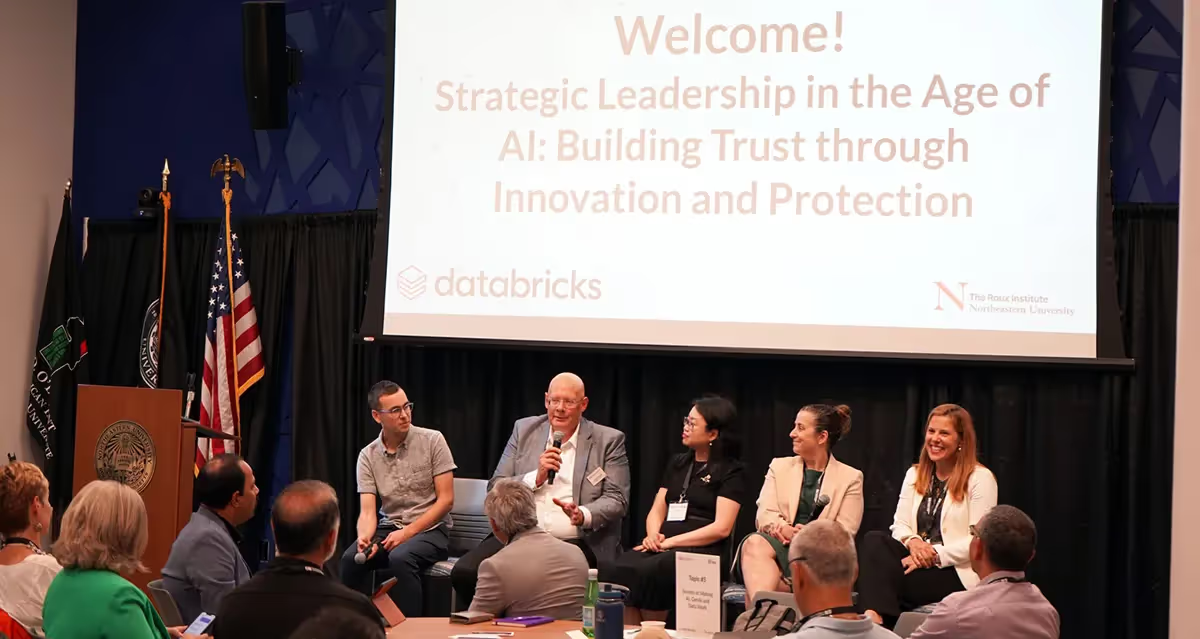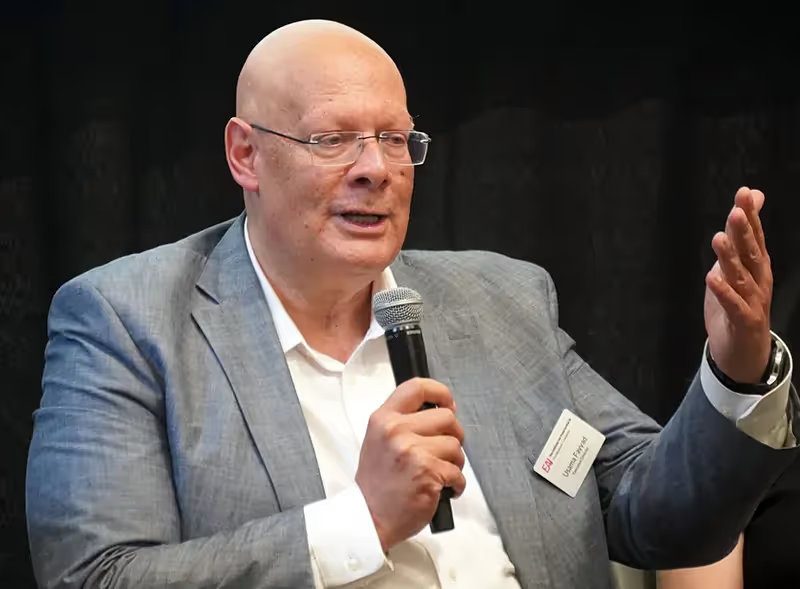Industry Leaders Reveal Challenges, Solutions for Harnessing AI

If artificial intelligence is going to transform industries as predicted, executives must position their organizations to thrive through the coming wave of disruption. The task requires them to craft a strategy for integrating AI into their operations, navigate ethical and regulatory challenges, and get buy-in from people at every level of the organization. In short, it requires leadership.
That was the focus of an exclusive gathering of high-level executives at Northeastern University Monday, July 15. The event, titled “Strategic Leadership in the Age of AI: Building Trust through Innovation and Protection” was co-hosted by BigID and Databricks along with the Institute for Experiential AI and the Roux Institute at Northeastern University.
Leaders from healthcare, finance, cybersecurity, energy, government, and academia convened to share their vision for AI along with the challenges they’re facing and best practices. Attendees walked away with insights into how they might harness AI to give their organizations a competitive advantage.
"It was a great event with a diverse audience from different industries, all figuring out what AI means for their sector," said Usama Fayyad, the executive director of the Institute for Experiential AI. "Everybody was focused on what it takes to make AI work in an organization. I think there's real curiosity at one level, and there's a lot of careful optimism that this technology can help."

On Challenges and Opportunities

The event opened with a panel discussion featuring Fayyad, BigID Chief Data Officer Peggy Tsai, DataBricks Field Chief Data Officer Robin Sutara, Roux Institute Head of Partnerships Margaret Angell, and Institute for Experiential AI Core Faculty Member Byron Wallace, who is also an associate professor and director of the BS in Data Science Program at Khoury College of Computer Sciences at Northeastern University.
The conversation centered around the challenges and opportunities of deploying AI. One question was when organizations should rely on off-the-shelf large language models (LLMs) like ChatGPT versus investing in their own, smaller models.
“For most organizations today, that decision is made on a case-by-case basis,” Sutara said. “If anybody tells you they have one model that’s going to solve all your business problems, kick them out the door right now.”
Sutara said businesses trying to decide which models to use need to consider the nature of the problems they’re trying to solve, their existing technical platforms, employee empowerment, policies, controls, regulations, and governance.
Tsai discussed the data privacy concerns that come from using proprietary data in off-the-shelf large language models (LLMs).
“For the most part, organizations know what’s in their structured data, and they’re reasonably aware of the sensitivity and confidentiality of that data,” Tsai said. “But the unstructured data is untapped and largely unknown, and that’s where companies may accidentally expose personal information. You still need to comply with privacy regulations, so being able to have governance and control [of unstructured data] is critical.”
Different Industries, Similar Problems
Following the panel, attendees broke into groups to focus on various aspects of the AI transformation. Despite the diversity of backgrounds at each table, the attendees found they were grappling with similar issues.
The six topics were:
- Data-Driven Decision Making and Strategic Innovation
- AI and Big Data in Industry Verticals
- Building a Culture of Innovation and Continuous Learning
- Building Effective AI Ecosystems: Compliance and Regulatory Challenges
- Secrets of Making AI, GenAI and Data Work
- AI and Data Analytics in Energy Management and Sustainability
"Our challenges were largely the same," said Govinda Bhisetti, vice president of the drug discovery company Cellarity. "We were able to learn from each other around topics like how organizations can adapt to new technology, define use cases, convince people to use technology, and more. The different backgrounds were useful because we all brought different experiences."
Another common theme was empowering people, from employees to chief executives. No technology, after all, exists in a vacuum, and training was top-of-mind for many attendees.
“Our biggest challenge is making time for learning,” said Sun Life Associate Vice President David Burton. “It’s an age-old challenge that dates much further back than AI. But now, with technology evolving so quickly, it’s really important to get our employees the time and to get leadership to buy into [training initiatives].”
Establishing Best Practices
At the end of roundtable discussions, a member of each group presented the lessons they’ve learned from implementing AI. Presenters emphasized the importance of choosing the right use cases, establishing ownership over each project, and crafting clear, strategic communications around AI initiatives.
To mitigate some ethical concerns, Fayyad said he believes almost all enterprise generative AI applications should remain internal rather than interacting with the customer.

“With where the technology is and its state of readiness today, I wouldn’t [deploy it with customers],” Fayyad said. “These models are unpredictable, and when you ask it something unusual in an area the data doesn’t cover well, or it hasn’t seen that type of question before, it’s almost guaranteed that the answer is going to be totally random.”
Fayyad listed several reasons why AI projects fail within organizations, including companies collecting the wrong data, asking the wrong questions of their data, and relying too much on expensive LLMs when smaller models would suffice.
Many attendees also discussed the importance of having a human in the AI loop, or what Northeastern University refers to as “experiential AI.”
“AI technology is evolving, but technology is not going to be the only solution,” said Robin Sutara, field chief data officer of DataBricks. “If you’re depending on tech alone to solve some of these problems without deciding how to trigger notifications for a person to step in, [you’re exposing yourself] to malicious behavior. But the organizations that do nothing and wait for others to figure this out will be left behind.”
Members of the Institute for Experiential AI said they learned just as much as attendees from the event.
“We work with companies to solve narrow issues they’re facing in their industries, but we wanted to explore the bigger issues more broadly,” Fayyad said. “We confirmed that a lot of the problems [to benefiting from AI] are business problems, not technical problems, so we’re getting a better understanding of the landscape of problems these companies are dealing with.”
Interested to learn more about how the Institute for Experiential AI helps organizations tap into the power of AI? Check out our AI Solutions Hub or attend one of our industry events.




